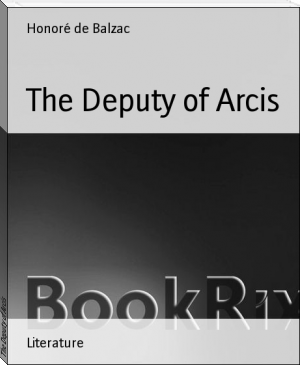The Deputy of Arcis - Honoré de Balzac (little red riding hood read aloud TXT) 📗

- Author: Honoré de Balzac
Book online «The Deputy of Arcis - Honoré de Balzac (little red riding hood read aloud TXT) 📗». Author Honoré de Balzac
"But I suppose he had some friends and acquaintances in the town?"
"Not the ghost of one,--unless it might be that nun. Fortune, relations, father, even a name, he never had until the day of his arrival at Arcis two weeks ago; and now, if you please, the Comte Charles de Sallenauve, seigneur of the chateau of Arcis, is elected to the Chamber of deputies! God only knows how it was done! The pretended head of a former great family, representing himself as absent in foreign lands for many years, suddenly appears with this schemer before a notary in Arcis, recognizes him at a gallop as his son, buys the chateau of Arcis and presents it to him, and is off during the night before any one could even know what road he took. The trick thus played, the abbess and her aide-de-camp, the organist, launched the candidate, and at once republicans, legitimists, conservatives, clergy, nobility, bourgeoisie, in fact everybody, as if by some spell cast upon that region, all did the bidding of that old witch of a nun, and without the stalwart battalion of the functionaries (who under my eye stood firm and did not flinch), his election would have been, like yours, unanimous."
"Then, my poor friend, good-bye to the _dot_."
"Not precisely; though it must certainly be adjourned. The father grumbles because the blessed tranquillity of his life was disturbed and he himself covered with ridicule, though the poor dear man had already enough of that! The daughter still wants to be a countess, but the mother takes it hard that her political salon should be floating away from her, and God knows how far I shall be led in order to comfort her. Besides all this, I myself am goaded by the necessity of having to find the solution of my own problem pretty soon. I _had_ found it there: I intended to marry, and take a year to settle my affairs; at the next session I should have made my father-in-law resign and stepped into his seat in the Chamber; then, you understand, what an horizon before me!"
"But, my dear fellow, political horizon apart, don't let that million slip through your fingers."
"Oh, heavens! as for that, except for the delay, I feel safe enough. My future family is about to remove to Paris. After this mortifying defeat, life in Arcis will not be endurable. Beauvisage (forgive the name, it is that of my adopted family)--Beauvisage is like Coriolanus, ready if he can to bring fire and slaughter on his ungrateful birthplace. Besides, in transplanting themselves hither, these unfortunate exiles know where to lay their heads, being the owners of the hotel Beauseant."
"Owners of the hotel Beauseant!" cried the colonel, in amazement.
"Yes; Beauseant--Beauvisage; only a termination to change. Ah! my dear fellow, you don't know what these provincial fortunes are, accumulated penny by penny, especially when to the passion for saving is added the incessant aspiration of that leech called commerce. We must make up our minds to some course; the bourgeoisie are rising round us like a flood; it is almost affable in them to buy our chateaus and estates when they might guillotine us as in 1793, and get them for nothing."
"Happily for you, my dear Maxime, you have reduced the number of your chateaus and estates."
"You see yourself that is not so," replied Maxime, "inasmuch as I am now engaged in providing myself with one. The Beauseant house is to be repaired and refurnished immediately, and I am charged with the ordering of the work. But I have made my future mother-in-law another promise, and I want your help, my dear fellow, in fulfilling it."
"It isn't a tobacco license, or a stamped-paper office, is it?"
"No, something less difficult. These damned women, when hatred or a desire for vengeance takes possession of them, are marvels of instinct; and Madame Beauvisage, who roars like a lioness at the very name of Sallenauve, has taken it into her head that beneath his incomprehensible success there is some foul intrigue or mystery. It is certain that the appearance and disappearance of this mysterious father have given rise to very singular conjectures; and probably if the thumb-screws were put upon the organist, who was, they say, entrusted with the education of the interesting bastard, we might get the secret of his birth and possibly other unexpected revelations. Now I have thought of a man on whom you have, I believe, great influence, who might in this hunt for facts assist us immensely. Don't you remember the robbery of those jewels from Jenny Cardine, about which she was so unhappy one night at Very's? You asked the waiter for pens and paper, and on a simple note which you sent at three o'clock in the morning to a Monsieur Saint-Esteve the police went to work, and before the evening of the next day the thieves were captured and the jewels restored."
"Yes," said the colonel, "I remember all that; my interference was lucky. But I must tell you that had I paused to reflect I should not have treated Monsieur de Saint-Esteve so cavalierly. He is a man to be approached with greater ceremony."
"_Ah ca_! but isn't he a former galley-slave, whose pardon you helped to obtain, and who feels for you the veneration they say Fieschi felt for one of his protectors?"
"Yes, that is true. Monsieur de Saint-Esteve, like his predecessor, Bibi-Lupin, has had _misfortunes_; but he is to-day the head of the detective police, the important functions of which office he fulfils with rare capacity. If the matter concerned anything that comes within his department, I should not hesitate to give you a letter to him; but the affair you speak of is delicate; and in any case I must first sound him and see if he is willing to talk with you."
"I thought you managed him despotically. Let us say no more about it, if you think it so very difficult."
"The greatest difficulty is that I never see him; and I naturally cannot write to him for such an object. I should have to watch for an occasion, a chance meeting. But why don't you speak of this to Rastignac? He could give him an order to act at once."
"Don't you understand that Rastignac will receive me very ill indeed? I had assured him, by letter, of success, and now I am forced to report in person our defeat. Besides, on every account, I would rather owe this service to your friendship."
"Well, it sha'n't fail you," said the colonel, rising. "I'll do my best to satisfy you; only, there must be a delay."
The visit had lasted long, and Maxime felt that a hint was given him to abridge it. He therefore took leave, putting into his manner a certain coldness which the colonel appeared not to notice.
No sooner had Monsieur de Trailles departed than Franchessini opened a pack of cards and took out the knave of spades. This he cut up in a curious manner, leaving the figure untouched. Placing this species of hieroglyphic between two sheets of paper, he consigned it to an envelope. On this envelope and disguising his hand the colonel wrote as follows:--
Monsieur de Saint-Esteve, rue Saint-Anne, near the Quai des
Orfevres.
That done, he rang the bell and gave orders to put up his carriage, which he had ordered before Maxime's arrival; after which he went out alone on foot, and threw his singular missive into the first street letter-box that he passed. He had taken care, before he left the house, to see if it were properly sealed.
II. A CONVERSATION BETWEEN ELEVEN O'CLOCK AND MIDNIGHT
As a result of the elections which had just taken place, the ministry, contrary to expectation, maintained a majority in the Chamber,--a doubtful and provisional majority which would give it an uncertain and struggling existence. But, at any rate, it had obtained that merely numerical success which parties seek at any price to prolong their power. The Te Deum was sung in all its camps,--a paean which serves as well to celebrate victorious defeats as honest victories.
On the evening of the day when Colonel Franchessini received the visit from Maxime de Trailles, the general result of the elections was made known. The ministers of the left bank, whose wives received on that day, found their salons crowded, particularly the Comte de Rastignac, the minister of Public Works.
Madame de l'Estorade, too much absorbed in her children to be very exact in the fulfilment of her social duties, had owed a visit to Madame de Rastignac ever since the evening when the minister's wife had interrupted her conversation with the sculptor apropos of the famous statue. Monsieur de l'Estorade, zealous conservative as we know already, had insisted that politics and politeness now combined to oblige them both to pay this social debt. Arriving early, in order to be rid the sooner of such a bore, Madame de l'Estorade found herself seated at the upper end of a circle of women, while the men stood about them conversing. Her chair was side by side with that of Madame de Rastignac.
In hoping to make her visit short, Madame de l'Estorade had not counted on the allurements of conversation which, under the circumstances of this so-called political victory, laid hold of her husband. A man of more influence by his judgment than by his oratory in the Chamber of Peers, Monsieur de l'Estorade, as he circulated through the salons, was stopped at every turn by the various notabilities of politics, finance, and diplomacy, and requested to give his opinion on the future of the session now about to begin. To all such questions he replied with more or less extended observations, and sometimes he had the pleasure of finding himself the centre of a group respectfully receptive of his opinions. This success rendered him very inattentive to the telegraphy of his wife, who, watching his various evolutions, made him signs whenever she could catch his eye that she wished to go away.
The years that had elapsed since Monsieur de l'Estorade had obtained the hand of the beautiful Renee de Maucombe, while they had scarcely dimmed the splendor of her beauty, had considerably aged her husband. The twenty years' difference in their ages--he being now fifty-two, she thirty-two--was growing all the more apparent because even at the time of the marriage he was turning gray and his health was failing. An affection of the liver, latent for several years, was now developing, and at the same time the wilful disposition which is noticeable in statesmen and men of ambition made his mouth less sensitive to the conjugal bit. Monsieur de l'Estorade talked so long and so well that after a time the salons thinned, leaving a group of the intimates of the house around his wife and their hostess. At this moment the minister himself slipped an arm through his, and, leading him up to the group surrounding their two wives, Rastignac said to Madame de l'Estorade,--
"I bring you back your husband; I have just found him in criminal conversation with a member of the Zollverin, who would probably have clung to him all night if it had not been for me."
"I was myself on the point of asking Madame de Rastignac for a bed, that I might release





Comments (0)